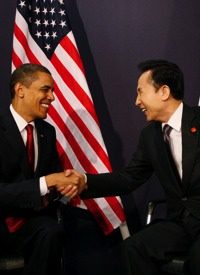
The AP reported that the KCNA statement also called President Obama "a hypocrite" for advocating a nuclear-free world while making "frantic efforts" to develop new nuclear weapons at home. The report did not mention the summit held between Obama and South Korean President Lee Myung-bak in Washington the previous day, during which the two leaders agreed to build a regional and global "strategic alliance" to persuade North Korea to dismantle all its nuclear weapons. However, there seemed to be an obvious connection between the timing of the report and the Obama-Lee meeting.
At a news conference held in the White House Rose Garden with President Lee, Obama said the United States would "vigorously" pursue an end to North Korea’s nuclear program. The president stated:
President Lee and I reiterated our shared commitment to the complete denuclearization of the Korean peninsula. We have reaffirmed the endurance of our alliance, and America’s commitment to the defense of the Republic of Korea. And we discussed the measures that we are taking with our partners in the region — including Russia, China and Japan — to make it clear to North Korea that it will not find security or respect through threats and illegal weapons.
Obama also cited the authority of the United Nations as a key component of strategy to restrain Pyongyang’s nuclear ambitions:
That united international front has been on full display since North Korea’s ballistic missile test in April, and was further galvanized by its recent nuclear test. On [June 12], the United Nations Security Council unanimously adopted a resolution that called for strong steps to block North Korea’s nuclear and ballistic missile programs. Now we must pursue a sustained and robust effort to implement this resolution together with our international partners. And in addition to the Korean peninsula, we are committed to a global effort to pursue the goal of a world without nuclear weapons — an effort that I will be discussing later this summer in Moscow and at the G8.
President Lee also commented on the important role of the UN:
As reiterated by President Obama, we agreed that under no circumstance are we going to allow North Korea to possess nuclear weapons. We also agreed to robustly implement U.N. Security Council Resolution 1874, and of course all parties will faithfully take part in implementing this resolution.
When Scott Wilson of the Washington Post asked the president if — considering North Korea’s adamant position that it should be recognized as a nuclear power and that it has set that as a precondition for normal relations with the United States and other nations — would it be an option for the United States simply to recognize North Korea as a nuclear power, Obama replied in the negative:
We have continually insisted that North Korea denuclearize. The Republic of Korea agrees with this position. Other allies like Japan agree with this position. China and Russia agree with this position. The United Nations Security Council reflects this view. We will pursue denuclearization on the Korean Peninsula vigorously.
Obama also issued a warning to Pyongyang that included compliance with what is — in effect — UN mandates: "North Korea has to make a decision and understand that prestige and security and prosperity are not going to come through the path of threatening neighbors and engaging in violations of international law." (Emphasis added.)
When a reporter asked President Lee for his views on North Korea’s rejection of the UN Security Council resolution, the South Korean leader answered, in part: "The recent Security Council resolution is not simply about words; it is about taking follow-up action and vigorously implementing the U.N. Security Council resolution. And we’ll make sure that we fully implement the UN Security Council resolution."
By "we," Lee made it obvious that he did not mean South Korea alone. He added: "The North Koreans must understand that their past behavior will not stand. And of course not only the U.S.-Korea close partnership, but Japan, China, and the rest of the international community will take part in this effort."
When asked about a new policy of interdicting North Korean ships at sea to enforce the Security Council resolution, Obama (following the precedent set by his predecessors, both presidents Bush) deferred to UN authority, stating:
This is not simply a U.S. policy; this is a international policy. This was part of what the Security Council resolution calls for, is the interdiction of arms shipments. How that’s going to be implemented, how we approach cooperation between various countries to enforce this, is something that the United States, South Korea, China, Russia, all relevant actors — Japan — all relevant actors will be discussing in the months to come.
This recognition of "international policy" by our president is not new, but it is disturbing nevertheless. It was "international policy" that immersed our nation in the Korean War, the Vietnam War, and the invasion of Iraq, to name just the most important conflicts. Recall that, prior to the first invasion of Iraq in 1990, President George H.W. Bush sought not a declaration of war from Congress (as the Constitution requires) but UN authorization, which he received in the form of Security Council Resolution 678. The second President Bush, following in his father’s footsteps, received "authorization" to invade Iraq in 2003 by Security Council resolutions 678 and 687.
However, while the UN (which consists of 192 members) does the "authorizing," which nation provides most of the troops and pays most of the bills to enforce UN resolutions? Why the good old United States, of course!
One would think that most Americans would have seen through this con game long ago. As the old saying goes: ""Fool me once, shame on you; fool me twice, shame on me."
AP Images: Photo of Obama and South Korean President Lee Myung-bak



